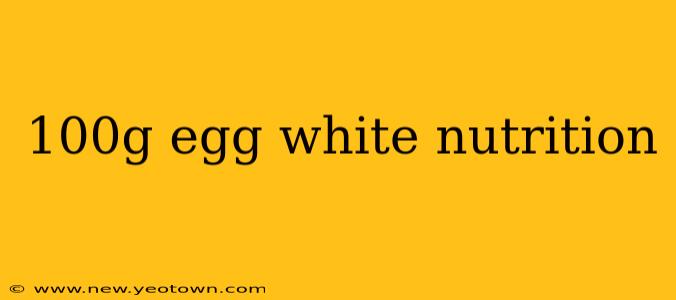Imagine this: you’re whipping up a fluffy omelet, the delicate scent of eggs filling your kitchen. But have you ever stopped to consider the nutritional powerhouse hidden within that seemingly simple egg white? While the whole egg offers a complete nutritional profile, 100g of egg white boasts a unique concentration of benefits, primarily focusing on its impressive protein content. This post will delve into the detailed nutritional breakdown of 100g of egg white, answering common questions and exploring its role in a healthy diet.
What are the macronutrients in 100g of egg white?
Let’s start with the basics. 100g of egg white is primarily composed of protein, with minimal carbohydrates and virtually no fat. This makes it a fantastic choice for those focusing on lean muscle growth or weight management. Think of it as nature's perfect protein packet! The exact macronutrient breakdown can vary slightly depending on the size and type of egg, but generally, you're looking at approximately:
- Protein: Around 10-12 grams. This is a significant amount of high-quality protein, rich in essential amino acids – the building blocks your body needs to repair and build tissues.
- Carbohydrates: Negligible amounts, typically less than 1 gram. This makes egg whites a low-carb option, suitable for various dietary plans.
- Fat: Essentially zero grams. This low-fat profile makes egg whites a popular choice for those watching their fat intake.
How many calories are in 100g of egg white?
The caloric content of 100g of egg white is surprisingly low, usually falling between 40-50 calories. This low-calorie, high-protein profile makes egg whites an ideal addition to weight-loss diets or for anyone looking to maintain a healthy caloric intake without sacrificing protein.
What are the vitamins and minerals in 100g of egg white?
While egg whites are not a significant source of vitamins and minerals compared to the whole egg (which contains the yolk rich in these nutrients), they still offer a respectable amount of certain nutrients. Expect to find small amounts of:
- Riboflavin (Vitamin B2): Important for energy metabolism.
- Selenium: An antioxidant that protects your cells from damage.
- Potassium: Essential for maintaining healthy blood pressure.
Are egg whites good for muscle building?
Absolutely! The high-quality protein in egg whites provides the essential amino acids crucial for muscle protein synthesis – the process your body uses to build and repair muscle tissue. Incorporating egg whites into your diet, especially after workouts, can support muscle growth and recovery.
Can I eat only egg whites and lose weight?
While egg whites can be a valuable part of a weight-loss diet due to their high protein and low-calorie content, relying solely on them is not recommended. A balanced diet encompassing a variety of nutrient-rich foods is crucial for overall health and well-being. Egg whites should be incorporated as part of a larger, balanced nutritional strategy.
Are there any downsides to eating only egg whites?
Yes, eliminating the yolk entirely means missing out on vital nutrients like Vitamin D, Vitamin A, Choline, and essential fatty acids found abundantly in the yolk. A balanced approach that includes both the egg white and the yolk is generally recommended for optimal nutrition.
What are some healthy ways to incorporate 100g of egg whites into my diet?
There are countless delicious and healthy ways to enjoy egg whites! Here are a few ideas:
- Omelets: A classic breakfast option, packed with protein and easily customizable.
- Frittatas: A baked egg dish that's perfect for meal prepping.
- Protein shakes: Blend egg whites into your favorite smoothie for a protein boost.
- Poached eggs: A simple and elegant way to enjoy egg whites.
Remember, a balanced approach to nutrition is always key. While 100g of egg white offers impressive benefits, it's best enjoyed as part of a diverse and well-rounded diet that includes fruits, vegetables, whole grains, and healthy fats. Consult with a registered dietitian or healthcare professional for personalized dietary advice.

